Social strategies for disabled children: the problem of assisted living
Based on the results of a survey of parents of disabled children in the Belgorod region, the problems related to the social strategies of disabled children in the region are considered. An indicator of the problem is the availability of an inclusive space for children with disabilities, an assessment of the possibilities for independent living of a disabled child, an assessment of the importance of the elements of accompanied accommodation, an assessment of the availability of resources for the organization of accompanied accommodation in the region, an assessment of the problems in the organization of accompanied accommodation for children with disabilities. The study was conducted using a massive online survey of parents of disabled children (N=1021). It is concluded that assisted living is one of the significant social strategies for children with disabilities. For a child with a disability, this means not only physical independence, but also the development of social skills necessary to interact with the outside world. These aspects were confirmed by the responses of the respondents to our study. However, insufficient funding and a shortage of qualified personnel could pose serious obstacles to the effective implementation of this social adaptation strategy. It is also relevant to inform the population about the opportunities and limitations in the implementation of this strategy at the regional level. Therefore, we believe that the main task of the regional authorities should be to increase the availability of information for families raising children with disabilities about social strategies in the Belgorod region, increase resources for the implementation of assisted living, as well as strengthen the training of specialists in this field.
Figures
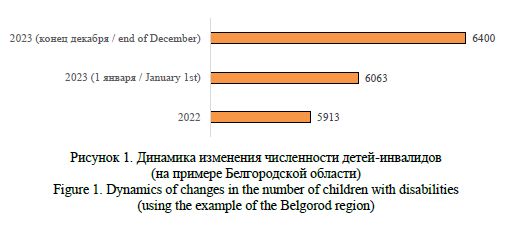
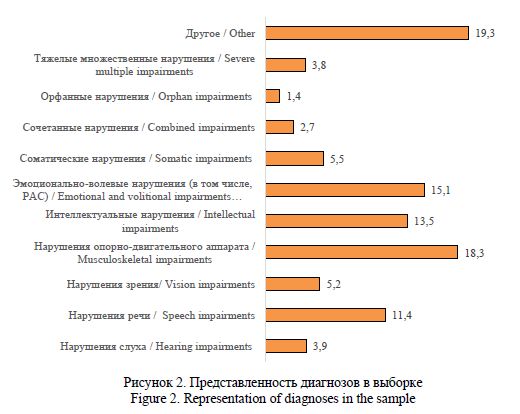
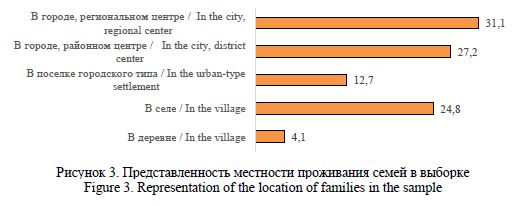
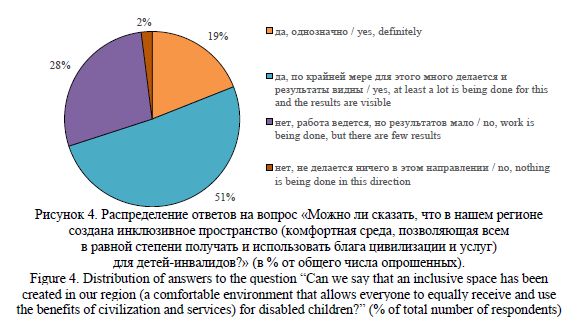
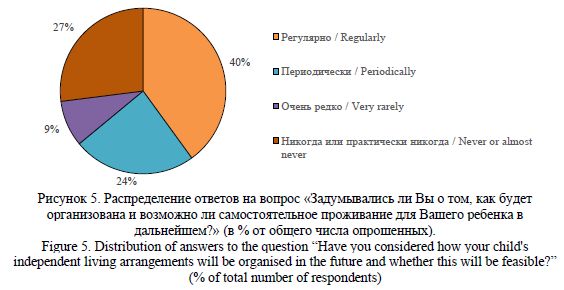
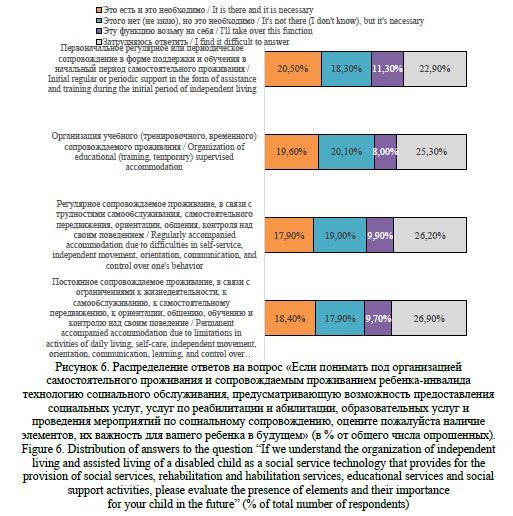
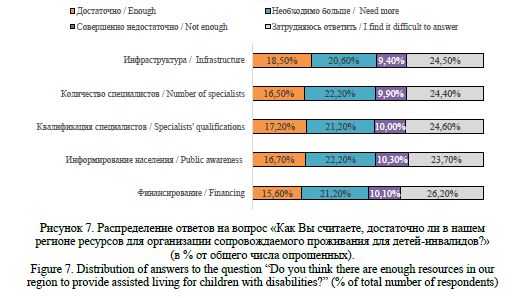
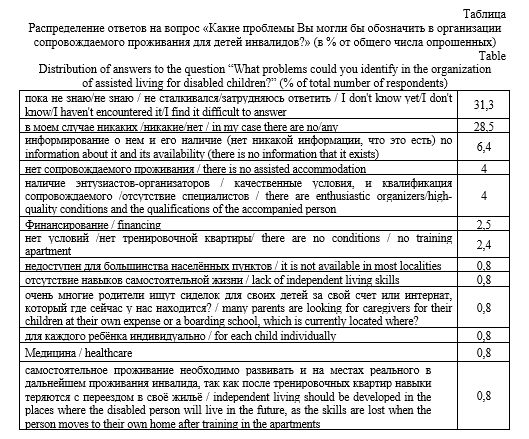
Kovalchuk, O. V. (2025), “Social strategies for disabled children: the problem of assisted living”, Research Result. Sociology and management, 11 (3), 286-298. DOI: 10.18413/2408-9338-2025-11-3-1-6.


















While nobody left any comments to this publication.
You can be first.
Aldasheva, A. B., Sirotina, T. V. (2017), “Supported Accommodation of Persons with Disabilities in the Russian Federation: Opportunities for Social Integration”, Sotsialnaya integratsiya i razvitie etnokultru v evraziyskom prostranstve, (5-2), 14-18. (In Russian)
Detochenko, L. S. (2021), “Involvement of children with disabilities in social relations and communities”, Vestnik Nizhegorodskogo universiteta im. N.I. Lobachevskogo. Seriya: Sotsialnye nauki, (4), 70-78, DOI: 10.52452/18115942_2021_4_70, EDN: CXZDZM. (In Russian)
Zaitsev, D. V., Sklyarova, T. V. (2019), “The development of inclusive culture practices in the work of social services: a sociological analysis of problems and prospects”, Byulleten nauki i praktiki, (11), 343-351, DOI: 10.33619/2414-2948/48/43, EDN: XJQWFQ. (In Russian)
Zubok, Yu. A. (2003), “Risk in the social development of youth”, Sotsialno-gumanitarnye znaniya, (1), 147-162. (In Russian)
Klochko, E. Y. (2016), “Life without barriers: about prospects”, Psihologicheskaya nauka i obrazovanie, 21 (1), 94-107, DOI: 10.17759/pse.2016210108, EDN: VSEQHD. (In Russian)
Kovalchuk, O. V. (2023), “Professional life strategies of disabled children as an indicator of the well-being of the region”, Research Result. Sociology and Management, 9 (3), 37-48, DOI: 10.18413/2408-9338-2023-9-3-0-4, EDN: GHZWNG. (In Russian)
Kovalchuk, O. V. (2024), “Professional life strategies of children with disabilities: a gap in professional orientation”, Nauchnye rezultaty sotsiologii-2023. Sbornik statey po materialam III Mezhdunarodnogo nauchnogo onlajn-foruma [Scientific results of sociology-2023. Collection of articles based on the materials of the III International scientific online forum], Belgorod, Russia, 89-95, EDN: GIDDCD. (In Russian)
Reznik, Yu. M. & Smirnov, E. A. (2002), Zhiznennye strategii lichnosti (opyt kompleksnogo analiza) [Personal life strategies (experience of complex analysis)], Moscow, Russia, 260. (In Russian)
Sklyarova, T. V. (2020), “Strategies and practices of inclusion of disabled children: a sociological analysis of effectiveness”, Materialy Mezhdunarodnoy modulnoy nauchno-prakticheskoy konferentsii «Inkljuziya dlya vseh – 2020: Sotsialnaya inkljuziya v sovremennom sotsiokulturnom prostranstve» [Proceedings of the International Modular Scientific and Practical Conference “Inclusion for All – 2020: Social inclusion in the modern socio-cultural space”], Samara National Research University named after Academician S.P. Korolev,Samara, Russia, 29-30. (In Russian)
Furyaeva, T. V., Markevich, A. N. (2016), “Modelling assisted living for young people with ASD as a condition for creating a new social inclusive practice”, Sibirskiy vestnik spetsialnogo obrazovaniya, (3), 43-49. (In Russian)
Checherina, O. B. (2016), “Assisted living as an effective alternative to neuropsychiatric boarding schools”, Setevoe izdanie «Elektronny zhurnal «Praktika Sotsialnoy raboty. Otkryty metodicheskiy resurs», (1), 1-13. (In Russian)
Chuprov, V. I. (1998), “Youth in social reproduction”, Sotsiologicheskie issledovaniya, (3), 93-106. (In Russian)
Shapovalova, I. S. & Zavodyan, I. S. (2021), “Generation Z: values, dispositions and socialization results”, Pokolenie Z: mnogoobrazie identichnostey, orientatsiy, povedeniya [Generation Z: diversity of identities, orientations, behavior], Ufa, Russia, 25-45. (In Russian)
Shapovalova, I. S. (2021), “Career strategies of provincial youth”, Sotsialnaya politika i sotsiologiya, 140, 173-182, DOI: 10.17922/2071-3665-2021-20-3-173-182, EDN: DYRHQM (In Russian)
The research was supported by a state assignment “Life strategies of youth in the context of the geopolitical transformation of the Russian space”, FZWG-2023-0016, 2023-2025.